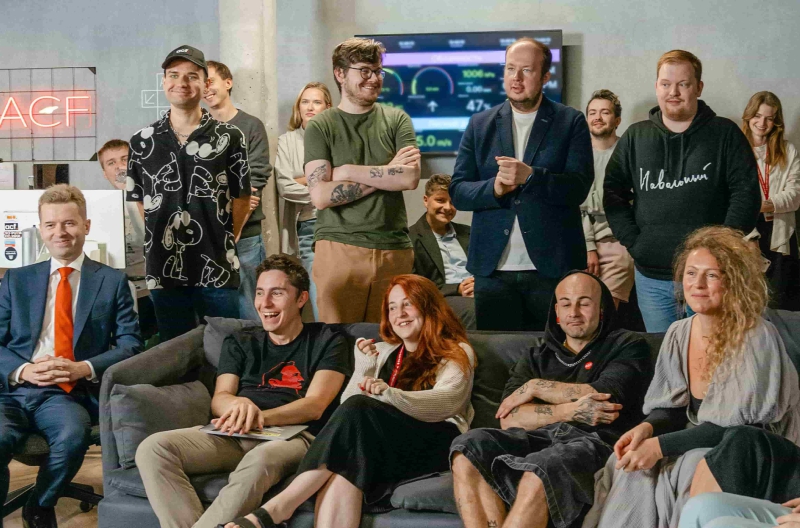The ACF (also known by its Russian acronym FBK) and Navalny’s regional headquarters were declared «extremist» organizations by the Russian government in 2021. Photo: fbk.info
The office of Russia’s Prosecutor General has filed a lawsuit with the country’s Supreme Court demanding that the foreign legal entity of the Anti-Corruption Foundation (ACF), the organization founded by the late opposition leader Alexei Navalny, be designated as a “terrorist organization.”
The lawsuit concerns The Anti-Corruption Foundation (ACF Inc.), which is registered in the United States. According to statements from Navalny’s team on Telegram and a report by the independent outlet Meduza, the hearing is scheduled for Nov. 27 and will be held behind closed doors.
“There is no doubt — on November 27 we will be declared terrorists. Another badge for our collection, and the top one at that. The Kremlin hasn’t come up with anything worse (yet). The ACF will become the first organization to receive the full host of Putin’s ‘awards’: foreign agents, undesirable, extremists, and now terrorists,” the foundation said in a statement.
In comments to Meduza, Leonid Volkov, a close associate of the late Navalny, noted that the Russian Supreme Court accepted the case directly as a court of first instance — an unusual move, since terrorism cases in Russia are normally handled by military district courts.
“On November 27, Judge Nefyodov, known for other high-profile cases of this kind, will don his fine robe and declare that the ACF is now a terrorist organization. We’ll be added to a very short list that includes al-Qaeda, ISIS, several Islamist jamaats, and a few others. The Taliban is also on the list, but with a note that its terrorist status is temporarily suspended. So the Taliban’s status is suspended, but ours will be active,” Volkov told the outlet.
According to ACF representatives, the “terrorist organization” designation could complicate the foundation’s operations abroad, especially its work with foreign partners, donors, banking institutions, and policymakers responsible for compiling sanctions lists.
Volkov cited previous cases in which Russian journalists and opposition figures had their accounts at the Lithuania and UK-based digital bank Revolut blocked after being added to Rosfinmonitoring’s list of extremists and terrorists.
In comments to The Insider, Yevgeny Smirnov, a lawyer from the human rights project Perviy Otdel (lit. “Department One), said the American legal entity of the ACF may face similar difficulties to those already experienced by individuals included on Russia’s extremist and terrorist registries:
“Being added to the terrorist list allows not only the freezing of all property in Russia — which, in this case, likely doesn’t exist — but also increases the risk of being included in international lists of such organizations. This makes it harder to maintain bank accounts in many countries and creates potential problems when dealing with partners,” Smirnov said.
The Russian legal regime distinguishes between “terrorist organizations” and “extremist organizations.” Many opposition or civil society groups are labelled “extremist” rather than formally “terrorist,” but the effect is nonetheless severe, imposing criminal liability for supporting, participating, or even sharing their materials online.
The law allows for organizations and individuals to be added to these lists often with limited procedural safeguards, with the freezing of bank accounts and other severe restrictions following a designation.
According to human-rights monitoring groups such as Amnesty International, these designations are frequently applied in ways that suppress dissent, targeting opposition figures, NGOs, and regional movements, rather than only violent or armed groups.
Notably, the Taliban was officially removed from the list of terrorist organizations by Russia’s Supreme Court on April 17, 2025. Before that, the Taliban had been listed as a terrorist organisation by Russia since 2003. The list also includes curious additions, such as that of the “Belgorod People’s Republic,” a non-existent “movement” that originated as a Ukrainian internet meme as social media users jokingly suggested the annexation of Russia's Belgorod Region by Ukraine — a reference to the Russian-annexed so-called “people's republics” in Luhansk and Donetsk.
The Anti-Corruption Foundation (ACF, also known by its Russian acronym FBK), is an NGO founded by the late Russian opposition leader Alexei Navalny. It investigates corruption by high-ranking Russian government officials and releases its reports in videos that attract millions of views. In 2017, its YouTube video “He Is Not Dimon To You” (or “Don't Call Him 'Dimon'”), accused then-Prime Minister (and former President) Dmitry Medvedev misusing an estimated $1.2 billion in state resources. Navalny accused Medvedev of using the funds to collect luxury properties, with one reportedly having a standalone duck house. After that, rubber ducks became protest symbols among Navalny’s supporters — and opponents of Vladimir Putin's government.
Another notable expose, “Putin’s Palace,” released in 2021, focused on the massive Black Sea residence which was built — via complex corruption schemes — for Vladimir Putin, with an estimated cost in excess of 100 billion rubles (over $1 billion). As of Oct. 23, 2025, the video has amassed 134 million views on YouTube.
The Russian ACF and Navalny’s regional headquarters were declared extremist organizations in 2021. Two years earlier, in 2019, the foundation had been designated a “foreign agent.” In Russia, the Anti-Corruption Foundation was formally liquidated as a legal entity in September 2021.

